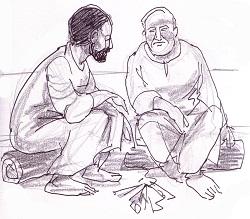
“Lord, you know everything; you know that I love you” (John 21:16).
If you are reading this today, it is because Jesus forgave Peter on a sandy beach after breakfast two millennia ago. This moving story of mercy and restoration is part of our story. Its implications are about us being the church right now.
All history, not surprisingly, is written looking back. But what may surprise us is how later interests shaped the story to hold up certain individuals as crucial. This selective, interpretive filter reveals the truths the community wants to protect that validate its own identity.
Today's two readings from Acts and John show how the early church recognized and rehabilitated Peter and Paul, two controversial figures whose martyrdoms in Rome became the foundation for the primacy of that church over other centers of Christian belief in Jerusalem, Alexandria and Antioch.
How Paul ended up in Rome is explained in Acts 25, when he escapes persecution in Jerusalem by using his Roman citizenship to appeal to Caesar to decide his case. In John 21, an addendum to the fourth Gospel, Peter is restored as leader of the Apostles after his heart-wrenching denial of Jesus. He is put to the ultimate test by Jesus’ question: “Do you love me?” If we love him, doors open and the future beckons us. We know what we must do to complete our journey.
It was apparently important to the church to “canonize” Peter and Paul as leaders of the Jewish and Gentile converts who formed the expanding community of faith in the Mediterranean world. What we learn from this history lesson is that the church is constantly recreating itself in each generation to apply the basic faith tradition to changing circumstances.
We are the church in 2023, and Pope Francis is calling us to recover the essential Gospel of mercy as our message to a troubled world. The age of doctrinal consolidation and warrior popes, Baroque churches and liturgies, fortress mentality and unbending legalism are not what is needed by the global community on the brink of enormous challenges to its survival and future direction. What our world needs now more than anything else is hope and reconciliation.
One year ago, a dear friend dying of cancer shared today’s Gospel story with me. When the question “Do you love me?” was posed, he looked at me and emphatically declared, “He knows!” This was the testament of faith that accompanied him as he died at age 52. It summed up his life and was his passage to eternity. How we answer this same question is the measure of our openness to the mystery of the Holy Spirit being offered to us on Pentecost.
Pentecost 2023 may someday be seen as a marker in the history of the church as the time we changed course toward a more sustainable planet, one human family and the beloved community God asks us to be. Do we love God? Will we join that effort? The Holy Spirit is poised to give every gift needed to save the world, and the Spirit awaits our “yes.”







